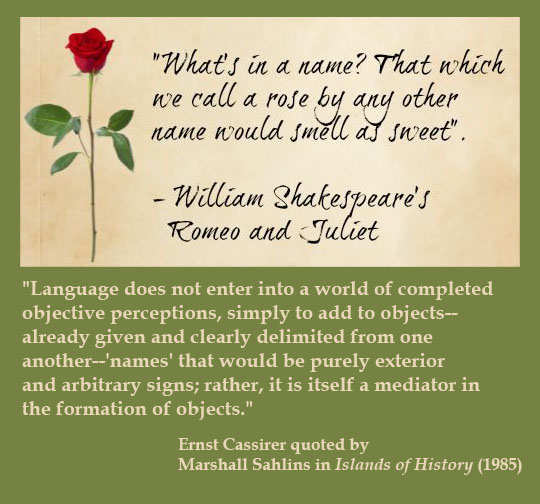

A Peer Reviewed Blog

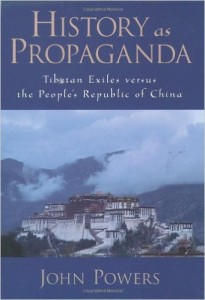 In History as Propaganda: Tibetan Exiles versus the People’s Republic of China, John Powers surveys a wide variety of histories of Tibet, written by Tibetan, Chinese, and western (i.e., American or European) authors. The story of the relations between China and Tibet — is Tibet an independent state or merely a small part of China’s empire? — can be told in many different ways, depending on the interests or agenda of the author spinning the narrative. Of particular interest to me is how Powers notes the normative vocabulary of the historians he surveys. The authors tend to systematically use normative nouns and adjectives — with positive and negative valuations attached to them — in their narratives. See the following two tables: Continue reading “On the Systematic Use of Normative Vocabulary”
In History as Propaganda: Tibetan Exiles versus the People’s Republic of China, John Powers surveys a wide variety of histories of Tibet, written by Tibetan, Chinese, and western (i.e., American or European) authors. The story of the relations between China and Tibet — is Tibet an independent state or merely a small part of China’s empire? — can be told in many different ways, depending on the interests or agenda of the author spinning the narrative. Of particular interest to me is how Powers notes the normative vocabulary of the historians he surveys. The authors tend to systematically use normative nouns and adjectives — with positive and negative valuations attached to them — in their narratives. See the following two tables: Continue reading “On the Systematic Use of Normative Vocabulary”

This post originally appeared on the Practicum blog.
In Religion & Society—my introductory religious studies course — I regularly use the 1998 comedy Pleasantville to engage in a discussion about how we’re socialized to actively seek conformity to the existing social order. The film is about two teens — David, played by Tobey Maguire, and Jennifer, played by Reese Witherspoon—who are magically transported from the 1990s into a 1950s sitcom; they immediately begin to chafe under the social expectations of small town life. As they start deviating from the social norms of the fictional sitcom world (and encourage others to do so as well), they disrupt the life of the entire town. (If you haven’t seen it, the trailer is below. Note: there are spoilers further down.) Continue reading “Pleasantville and Social Reproduction”
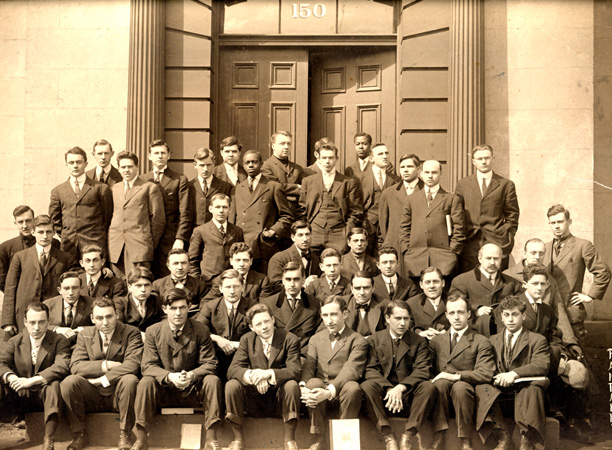
As a college professor I often hear faculty lament the students we have “these days”; there’s a nostalgic decline-and-fall narrative we tell, according to which we’re far removed from the golden age when students were prepared for college and could actually read and write upon arrival. If only we could return to the seventeenth century, when students came to college reading Latin and knowing their Seneca and Cicero!
However, when this narrative is shared (and, to be honest, I’ve told the tale myself), what I hear — what that narrative seems to implicitly suggest — is this: things were better back in the old days, before they let a lot of women and blacks and kids from the working class into college. Continue reading “The Golden Age”
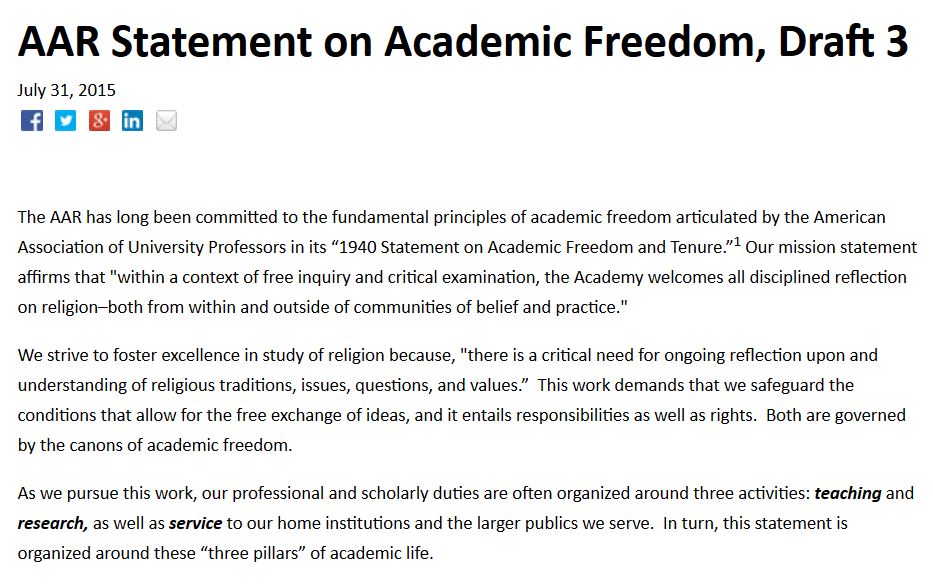 Recently, the Board of Directors of the American Academy of Religion released a draft update to its 2006 statement on Academic Freedom and the Teaching of Religion and solicited feedback from members. Given that the members of Culture on the Edge are all scholars of religion, some have opted to offer their feedback to the AAR via this short series of posts on our site. (An index to all the posts in this series can be found here)
Recently, the Board of Directors of the American Academy of Religion released a draft update to its 2006 statement on Academic Freedom and the Teaching of Religion and solicited feedback from members. Given that the members of Culture on the Edge are all scholars of religion, some have opted to offer their feedback to the AAR via this short series of posts on our site. (An index to all the posts in this series can be found here)
Craig Martin
I’m extremely grateful to the AAR for including reference to the AAUP’s statement on collegiality; the requirement of collegiality and civility are potentially directly opposed to academic freedom. However, as Merinda Simmons noted earlier in this series, there appears to be a tension between those comments on collegiality and civility, on the one hand, and the recommendation that we be respectful, sensitive, patient, humble, and generous, on the other. The definitions of the former terms overlap largely with the definitions of the latter. Wikipedia—a good source of information about colloquial uses of words—reports that collegiality *involves respect* toward others. So we are to be respectful to others, but institutions cannot demand that we be respectful (i.e., collegial) toward others? Continue reading “Response to the American Academy of Religion’s Statement on Academic Freedom, Part 3”
 Recently I’ve been enjoying reruns of 3rd Rock from the Sun on Hulu. For readers unfamiliar, this NBC sitcom ran from 1996 to 2001 and focuses on four aliens that came to earth in the 1990s to do anthropological research on our species. The humor of the show is of course based on cultural misunderstandings as the aliens — residing in Ohio, USA — attempt to “fit in” and understand the locals. As in such shows, of course the audience learns more about being “human” by watching these aliens become humans themselves.” Continue reading “The Brilliance of Containing Whiteness”
Recently I’ve been enjoying reruns of 3rd Rock from the Sun on Hulu. For readers unfamiliar, this NBC sitcom ran from 1996 to 2001 and focuses on four aliens that came to earth in the 1990s to do anthropological research on our species. The humor of the show is of course based on cultural misunderstandings as the aliens — residing in Ohio, USA — attempt to “fit in” and understand the locals. As in such shows, of course the audience learns more about being “human” by watching these aliens become humans themselves.” Continue reading “The Brilliance of Containing Whiteness”

This is the first of two posts from the Edge on what is currently happening in Baltimore…
The recent protests in Baltimore have gained widespread media attention in the US, especially the level of violence to which the protesters have risen. It seems that both whites and African Americans are lamenting the actions of the violent protesters. One young African American man in Baltimore took to YouTube with this commentary, ending up on the front page of Reddit: Continue reading “On the Demonization of Violent Resistance”
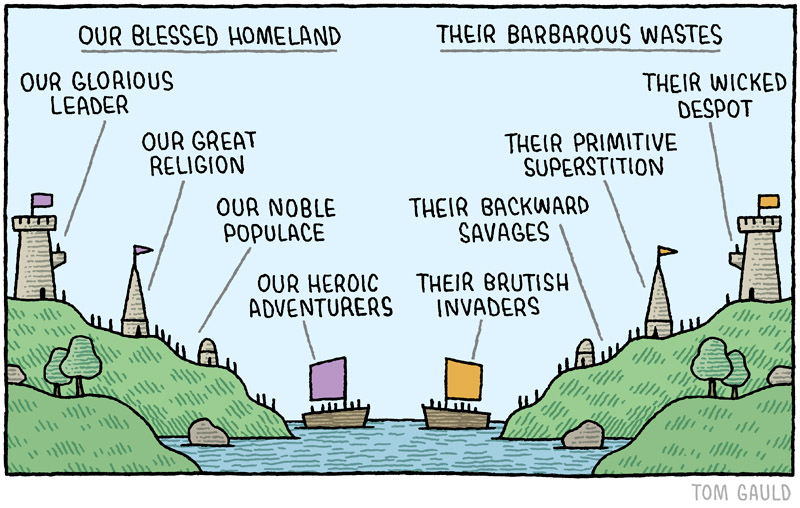
Original post can be found here.

For a new Culture on the Edge series “You Are What You Read” we’re asking each member to answer a series of questions about books—either academic or non-academic—that have been important or influential on us.
5. What’s a book that you love but which isn’t widely read?
Anything by Sara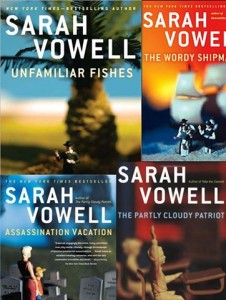 h Vowell.
h Vowell.
While enjoying her dry wit and occasional sarcasm, what I love so much about Sarah Vowell’s writing is that it is widely accessible yet incredibly well researched, making her the ideal example of what some of us aspire to do (perhaps on a blog such as this even?): reach wide audiences with our scholarship. While not thinking that this is the sole audience, or even a required audience, to reach, for anyone wanting to write for wider audiences than just other scholars or other scholars-in-the-making (regardless what level they are in school), Vowell’s books present the model for how to do this. She strikes me as a poster-child for the relevance of the Humanities, in fact—a much discussed topic these days—for her 1993 B.A. from Montana State University in Modern Languages and Literature and her M.A., earned at The School of the Chicago Art Institute in 1996, in Art History are both in areas that, at least according to some, have little direct relevance for employability. Yet here she is, a widely selling author (even the voice of the daughter, Violet, in the animated film The Incredibles!) whose engaging books dive deeply into terribly complicated and, at times, controversial historical material—I think back to a sad, funny, troubling, and, ultimately, incredibly engaging story she did in 1998 on her and her twin sister’s summer travels along the Trail of Tears or her 2003 dissection of the tangled history of The Battle Hymn of the Republic, each remarkable pieces of history writing—but doing so in a way that makes the storyteller’s (or, in the case of the latter, the singer’s) own conflicted positioning part of the narrative as well.
So pick up one of her books, and see what you think—you may find them to be far more relevant for scholars and students that you might at first think, either as an example of how to write for wider publics or as an example of the skills that we in the liberal arts daily teach to our students (sometimes without even knowing it).
Many of you will have seen Steven Ramey’s recent post on how nacho cheese is a floating signifier: it lacks a legal definition and, as such, its use is recreated on an ongoing basis by different social actors, many of whom profit from peddling their wares as “nacho cheese.”
Steven’s post was picked up and commented on by Timothy Michael Law at Marginalia. While reading, I noticed a provocative juxtaposition between the nacho cheese comments and an advertisement for other Marginalia content:
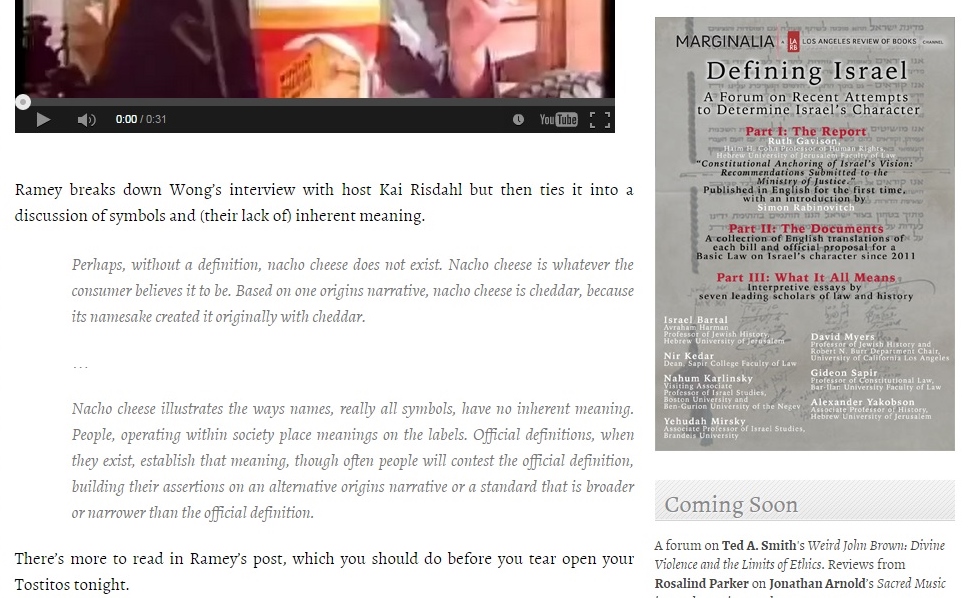 “Israel,” like “nacho cheese,” is a floating signifier subjected to ongoing recreation and contestation. In fact, the quotation from Steven’s post would be just as true if we swapped the terms: Continue reading “Israel Is Nacho Cheese, Or Why You Should Study Religion”
“Israel,” like “nacho cheese,” is a floating signifier subjected to ongoing recreation and contestation. In fact, the quotation from Steven’s post would be just as true if we swapped the terms: Continue reading “Israel Is Nacho Cheese, Or Why You Should Study Religion”